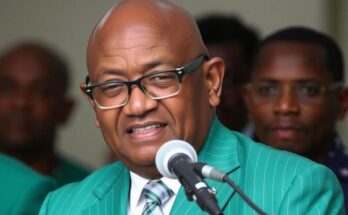Ethiopia appointed Ambassador Taye Atske Selassie as its new president following the end of Sahle-Work Zewde’s term. His election occurs against a backdrop of strained relations with Somalia, exacerbated by a recent MoU with Somaliland that has drawn criticism from Somali authorities and led to the exclusion of Ethiopian military participation in future AU missions in Somalia.
On Monday, Ethiopia appointed Ambassador Taye Atske Selassie as its new president, following the end of President Sahle-Work Zewde’s term. This transition occurs amidst ongoing tensions between Ethiopia and Somalia, particularly concerning recent territorial agreements involving Somaliland. Ambassador Taye, who previously served as the Minister of Foreign Affairs, was elected in a joint session of the People’s Representatives and the House of Federation, where he also presented the government’s annual fiscal plan. In Ethiopia, the presidency is largely ceremonial, with significant governmental authority resting with the Prime Minister. The appointment comes at a time when Ethiopia stands accused of violating Somalia’s territorial integrity after entering a Memorandum of Understanding with Somaliland, which includes provisions for access to the Red Sea. This move has sparked a strong reaction from the Somali government, which has demanded the withdrawal of the MoU. Furthermore, Somalia has announced that Ethiopian National Defense Forces will not be permitted to participate in the forthcoming African Union Support and Stabilization Mission in Somalia, set to commence in 2025. The recent developments highlight the intricate dynamics within the Horn of Africa, as Ethiopia navigates its foreign relations while addressing internal governance matters.
Ethiopia’s political landscape has been characterized by significant transitions and external challenges, particularly concerning its relationship with neighboring Somalia. The appointment of Taye Atske Selassie as president symbolizes a shift in a ceremonial leadership role while also emphasizing the complexities in Ethiopia’s diplomatic engagements, notably involving Somaliland. The Memorandum of Understanding with Somaliland has raised questions regarding Ethiopia’s adherence to Somalia’s territorial sovereignty, prompting diplomatic disputes that remain unresolved. Ethiopia’s involvement in peacekeeping operations, specifically the African Union support missions, illustrates the broader implications of these tensions for regional stability and cooperation.
The appointment of Ambassador Taye Atske Selassie as Ethiopia’s president amid rising tensions with Somalia reflects the delicate balance of maintaining domestic governance and foreign relations within the Horn of Africa. As Ethiopia seeks to navigate these challenges, particularly regarding the contentious MoU with Somaliland, the ongoing diplomatic rifts will require careful management to ensure regional stability.
Original Source: www.garoweonline.com




